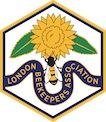
|
London Beekeepers' Association |

|
London Beekeepers' Association |
London Bee Situation
LBKA has been aware for some time that the continuing rise in beekeeping in London might be creating some issues of social inconvenience, animal welfare (for the honey bees) and nature conservation, albeit unintended. In 2020, LBKA produced an internal report called the London Bee Situation, which gathered together existing data to give an evidence-based overview. Our members agreed in 2021 that we should make the Report publicly available. Some of the available data is far from perfect but the fundamental picture will not be changed, even by substantial changes in data. In short, whilst there are undoubted benefits from urban beekeeping we believe there are issues that need to be addressed now. Further, a scientific paper, State of the World's Urban Ecosystems, by Professor Phil Stevenson (Kew Science, 2020), includes a section on urban beekeeping partly based on our own report. Professor Stevenson uses different and more up to date sources of forage data and his conclusions show London (at least in parts) to be a global example of unsustainable urban beekeeping. An article published in the Guardian "Honey bees are voracious" (24 July 2021) throws further light on the situation. Dave Goulson, in his book "Gardening for Bumblebees" (2021) says (p55): "There is plentiful evidence that honey bees can compete with our wild pollinators, taking much of the available pollen and nectar, particularly when large numbers of hives are kept together. Honey bee hives can also spread diseases to wild insects. I don't want to discourage anyone from keeping honey bees, for it is a fascinating and enjoyable hobby, and I love to eat honey myself, but do bear these issues in mind. If you do have honey bee hives, try and make sure you provide lots of flowers so there is plenty of food to go around. As an approximate rule of thumb, one honey bee colony will use all the nectar and pollen in half a hectare of flower-rich habitat." One of the most important things we have learned to recognise is that London is not an homogeneous environment. The quality of habitat (forage) for pollinators varies greatly with specific location and the distribution of registered colonies is equally uneven. There are "hot spots" and "cold spots" for both habitat and honey bee density. Averages are misleading: many areas, particularly further out from the city centre, may currently be relatively balanced. It is central London and other hot spots that are of particular concern. And all the while the number of honey bee colonies continues to rise year on year. LBKA is committed to helping individuals and organisations keep bees responsibly and sustainably. We have published a Position Statement on sustainable beekeeping in London. Equally, our priority is to raise awareness of what has been happening in London over the past ten years and try to encourage a broader, more balanced and responsible interest in bees - all bees and other pollinators. Where the principal motive is to help bees and wildlife we promote our "Bees and Flowers go Together" initiative (see page 30 of the London Bee Situation). On the plus side, there is research on urban environments showing that many bees - both wild and managed - do better in urban environments than in rural areas. These are clues to a more positive future (for both rural and urban environments). Our Secretary (Simon Saville) spoke to Channel 4 News (18th August, 2022) about stresses to bees caused by Climate Change. |
©2026 London Beekeepers' Association |